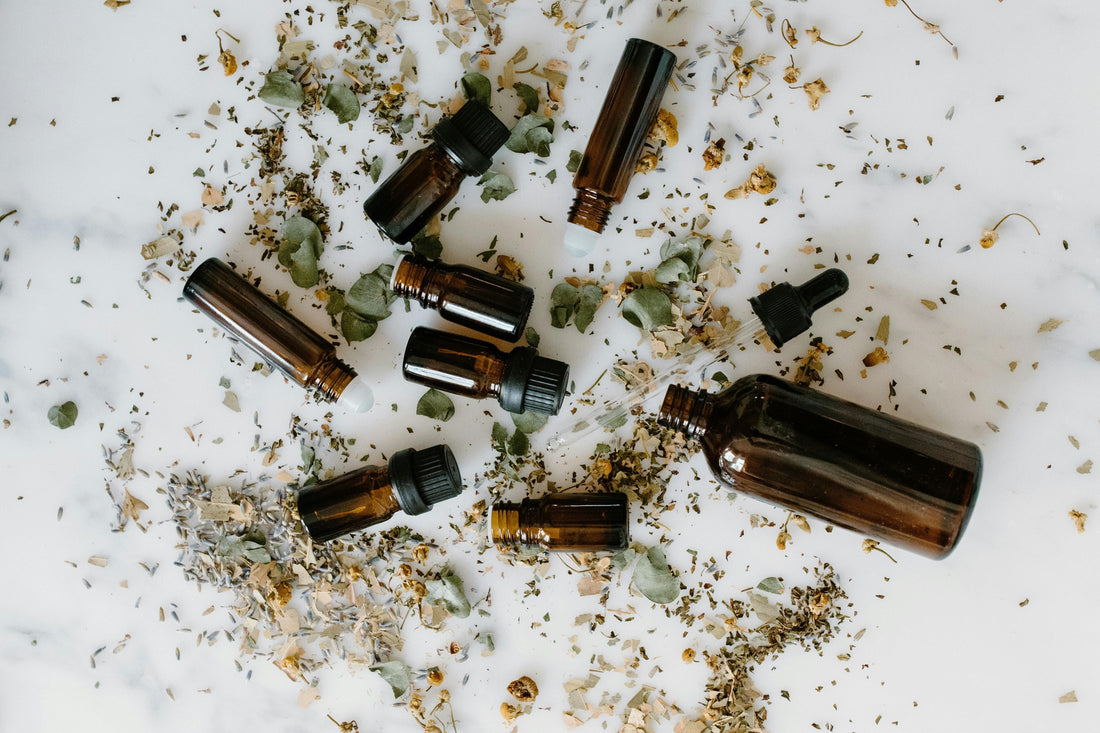
The Essential Oil Lover's Guide to Storage & Shelf Life
Share
Essential oils are little bottles of nature's magic — but like all natural things, they don't last forever. Over time, light, heat, and air can cause your favourite oils to lose their sparkle. The good news? With the right care, you can make sure every drop stays as fresh and fragrant as possible.
Whether it's the comforting calm of Lavender Essential Oil or the invigorating brightness of Lemon Essential Oil, this guide will walk you through everything you need to know about storage and shelf life.
Disclaimer: This article is for informational purposes only and does not replace medical advice. Essential oils should always be used responsibly—store them safely, never ingest them, and keep them out of reach of children and pets. Oils may oxidise or degrade over time; shelf-life ranges are approximate and depend on storage conditions. For topical use, dilute appropriately and patch test first (apply to a small area and wait 24 hours). Any references to “benefits” relate to traditional or aromatic use only and should not be taken as medical claims. If you have health concerns, consult a qualified healthcare professional.
Why Shelf Life Matters
Essential oils don’t spoil like food, but they do change. Oxygen, light, and heat can all affect the chemical composition of your oils over time — which means their scent, potency, and even safety can shift.
For example, a fresh bottle of Peppermint Essential Oil has a crisp, cooling aroma. But leave it uncapped on a sunny windowsill and it may smell flat or bitter within months.
Using oils beyond their best can result in:
-
Skin irritation or sensitisation
-
Reduced therapeutic benefits
-
Unpleasant or altered aromas
Keeping track of shelf life ensures you get the most out of every drop.
How Long Do Essential Oils Last?
Shelf life varies from oil to oil, depending on the botanical and chemical makeup:
-
Citrus oils like Bergamot, Grapefruit, and Lemon are highly volatile and tend to oxidise quickly. Use them within 1 to 2 years.
-
Herbaceous oils like Rosemary, Tea Tree, and Eucalyptus tend to last 2 to 3 years with proper care.
-
Woody and resinous oils such as Frankincense, Patchouli, and Cedarwood are more stable and can last up to 8 years or more.
When in doubt, check the aroma, clarity, and consistency — and trust your senses.
What Can Shorten Shelf Life?
Even the best oils won’t last forever, but there are a few common culprits that can cut their lifespan short:
-
Oxygen: Exposure to air oxidises the oil and changes its chemical composition. Always close bottles tightly.
-
Light: UV rays can degrade the oil. Keep bottles out of direct sunlight.
-
Heat: High temperatures break down delicate compounds. Avoid storing oils near radiators, stoves, or in cars.
-
Moisture: Never touch the inside of a dropper or bottle top with wet hands.
-
Wrong packaging: Essential oils should always be stored in dark glass bottles (like the ones used at Aroma Energy).
Practical Storage Tips
Good storage habits make all the difference. Here’s how to give your oils the best chance at a long and happy life:
-
Use amber glass bottles to protect from UV light (all of Aroma Energy’s oils come in these).
-
Keep caps tightly sealed when not in use.
-
Store oils in a cool, dark cupboard — or even the fridge for sensitive oils like Orange.
-
Label your oils with purchase or open dates. It’s a small habit that saves waste.
-
Keep oils upright to prevent slow leakage or deterioration of the cap.
How to Spot an Expired Oil
Not sure if it’s time to toss that bottle? Use your senses:
-
Smell: The scent is your biggest clue. If your once-sweet Ylang Ylang smells sour or metallic, it’s likely expired.
-
Look: Cloudy or thick oils may have oxidised.
-
Feel: An oil that has become sticky or unusually greasy can signal change.
When in doubt, repurpose older oils in DIY cleaning or home scent blends.
Smart Uses for Older Oils
If an oil's no longer ideal for your diffuser or skin, don’t bin it just yet. Here are some clever second-life ideas:
-
Add a few drops of older Lemongrass to vinegar and water for an effective cleaning spray.
-
Combine expired Clary Sage with baking soda to refresh carpets.
-
Place drops of strong oils like Cinnamon in bins or drains for a natural deodoriser.
Just be cautious using old oils on skin or in direct inhalation — they’re best for household use only.
What Makes Aroma Energy Oils Storage-Friendly?
At Aroma Energy, every detail is designed to protect your oils:
-
Bottled in UV-safe amber glass
-
Secure and resistant caps
-
Steam-distilled or cold-pressed to preserve freshness
-
Rapid batch turnover to ensure you're never getting a dusty shelf bottle
From everyday staples to rarer gems like Geranium, we make it easy to find the right oil — and keep it fresh for as long as possible.
Final Takeaway
Essential oils deserve a bit of TLC. With proper storage and mindful use, your collection will reward you with vibrant scents, soothing rituals, and aromatic joy for years to come.
When it’s time to refresh your shelf, explore our full Essential Oils Collection — carefully sourced, beautifully bottled, and ready to bring nature into your home.



